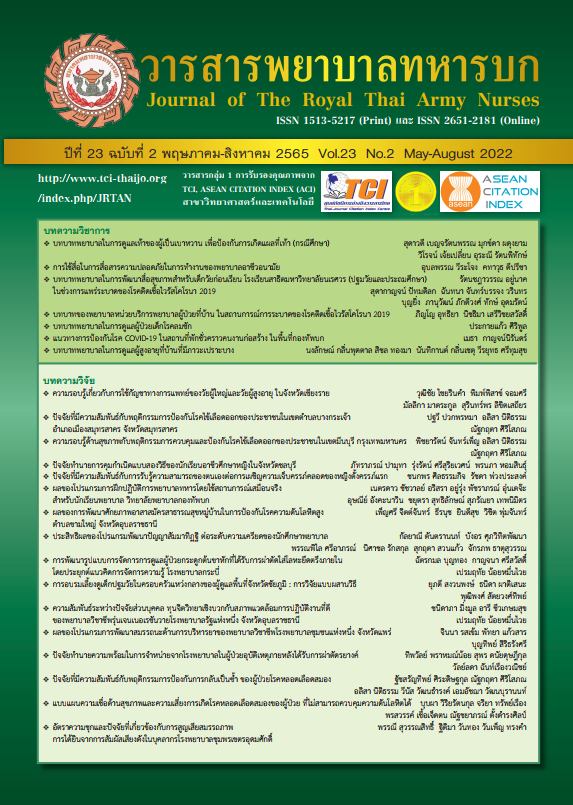The Enhancement of Adolescent Student’s Growth Mindset Through Integrated Group Counseling Program with Cognitive Behavioral Theory and Cognitive Group Activities
Keywords:
Integrative group counseling, Growth mindset, AdolescentAbstract
The purposes of this study were to: 1) study growth mindset of adolescent students, 2) develop integrative group counseling program of cognitive behavioral theory and cognitive groups activities, 3) study the results of integrative group counseling program of cognitive behavioral theory and cognitive group activities. The research was divided into two phases.The first phase was studying adolescent students’growth mindset. The sample group was 1,000 Junior High School adolescent students in Bang Khen District through the used of growth mindset test which was developed by the researcher and was analyzed by using norms. In the second phase the development of integrative group counseling program and studying the results of integrative group counseling program of cognitive behavioral theory and cognitive group activities. 20 students whose low scores of growth mindset were randomly assigned into an experimental group and a control group. Each group comprised of 10 students, 12 treatments were given. Each session lasted for 90 minutes, the data were analyzed by using repeated measures ANOVA.
The research results were as follows: 1. The results of the adolescent students’ growth mindset when compared to the norms, it was found that the growth mindset of most adolescent students were at the moderate level. There were 221 adolescent students with a high level of growth mindset, representing 22 percents, 553 adolescent students with moderate level of growth mindset, representing 55 percents, and 226 adolescent students with a low level of growth mindset, representing 23 percents. 2. The integrative group counseling program for enhancement of the growth mindset of adolescent students developed from Cognitive Behavioral Theory and group activities consisted of; Goal setting technique, Imagery technique, Automatic thoughts technique, Socratic Question technique, Cognitive technique, Behavior modification technique, Problem solving technique, Pie technique, Homework assignment technique, Behavioral experiment technique, and behavioral stimulation technique. The program was checked for quality, validated by 3 experts and before it was implemented. This integrative group counseling program composed of 3 stages: Initial stage, working stage, and concluding stage. 3. The experimental group had scores of growth mindset for post-test and the follow-up period higher than the control group with statistical significance at the level of .05. 4. The experimental group had scores of growth mindset for post-test and the follow-up period higher than before the experiment with statistical significance at the level of .05.
Downloads
References
Dweck, C. S. Mindset: The new psychology of success. New York: Random House; 2006.
Muller, C. M., & Dweck, C. S. Praise for intelligence can undermine children’s motivation and performance. Journal of Personality and Social Psychology. 1998; 75(1), 33-52.
Grant, H., and Dweck, C. Clarifying Achievement Goals and their Impact. Journal of Personality and Social Psychology. 2003; 85(3), 541-553.
Dweck, C. S. Mindset: How you can fulfill your potential. Constable & Robinson Limited; 2012.
King, R. B. How you think about your intelligence influences how adjusted you are: Implicit theories and adjustment outcomes. Personality and Individual Differences. 2012; 53(5), 705–709
Kaewkungwal S. Lifespan Human Development: adolescents - oldage. (Book 2). 9thed. Bangkok. Thammasat University Press; 2010; 329 (In Thai)
Department of Mental Health, Ministry of Public Health. 2019 (In Thai)
Kulnapadol P. Adolescent Counseling. 1thed. Chonburi: Company Get Good Creation Co., Ltd; 2019; 3 (In Thai)
Blackwell, L. A., Trzesniewski, K. H., & Dweck, C. S. Theories of intelligence and achievement across the junior high school transition: A longitudinal study and an intervention. Child Development. 2007; 78(1), 246–263
Kaewkungwal S. Lifespan Human Development: adolescents - oldage. (Book 2). 9thed. Bangkok. Thammasat University Press; 2010; 360-361 (In Thai)
Kumlerd S., Haenjohn J., & Supwirapakorn W. Development of Problem Solving Training Program Based on Acceptance and Commitment Therapy in Adolescents and Young Adults with Amphetamine Addiction. Journal of The Royal Thai Army Nurses 2019; 20(1): 181-187. (In Thai)
Downloads
Published
How to Cite
Issue
Section
License
Copyright (c) 2022 Journal of The Royal Thai Army Nurses

This work is licensed under a Creative Commons Attribution-NonCommercial-NoDerivatives 4.0 International License.
บทความหรือข้อคิดเห็นใดใดที่ปรากฏในวารสารพยาบาลทหารบกเป็นวรรณกรรมของผู้เขียน ซึ่งบรรณาธิการหรือสมาคมพยาบาลทหารบก ไม่จำเป็นต้องเห็นด้วย
บทความที่ได้รับการตีพิมพ์เป็นลิขสิทธิ์ของวารสารพยาบาลทหารบก
The ideas and opinions expressed in the Journal of The Royal Thai Army Nurses are those of the authors and not necessarily those
of the editor or Royal Thai Army Nurses Association.






